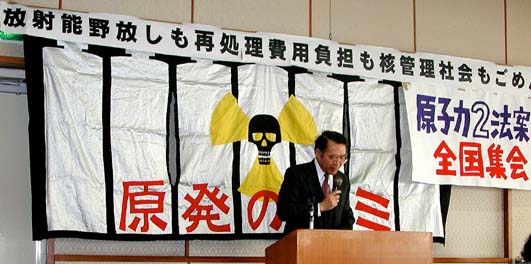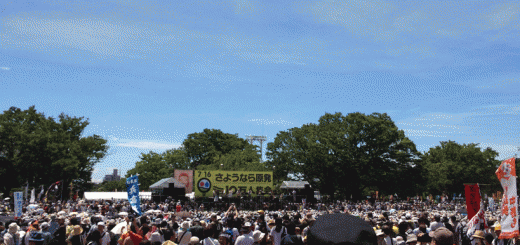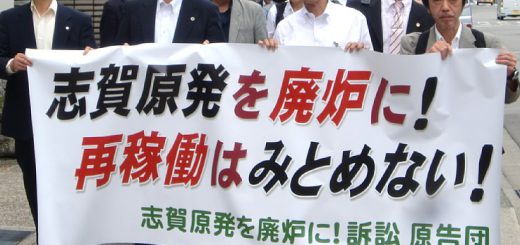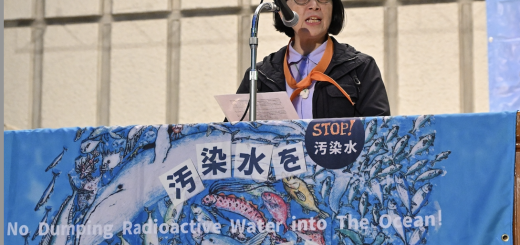Report on National Conference to Stop Two Nuclear Bills Nuke Info Tokyo No. 105
As discussed in NIT 104, a campaign has been launched against two nuclear bills covering, among other things, the introduction of a ‘clearance’ system for some low-level radioactive waste. The official title of the first bill is the Bill to Amend the Law for the Regulation of Nuclear Source Material, Nuclear Fuel Material and Reactors (Reactor Regulation Law). The second is the Bill for the Creation and Management of a Reprocessing Fund (CNIC’s translation). The government introduced both bills to the Diet on February 18th.
Prior to this, on February 6th, a national meeting opposing these two bills was held in Tokyo. Around 100 people attended. Following presentations by Kazuhide Sueda (Kansai Nuclear Waste Campaign) and Baku Nishio (CNIC) explaining the problems with the two bills, we heard reports from Iwate Prefecture, home to a medical radioisotope waste treatment center, and from Ibaraki Prefecture, where the dismantling of the Tokai reactor has begun. After these reports we discussed tactics for opposing these bills. One issue discussed was the need for simple, readily understandable language to express the problems with the two bills.
Unfortunately, parties supporting the bills hold more than half the seats in the Diet at the moment. It will be difficult to prevent passage of the bills, but even if they are passed, it is still possible for public opinion to prevent implementation of the clearance system.
Thanks to the work of Diane D’Arrigo of Nuclear Information and Resource Service (NIRS), over 80 organizations and over 120 individuals from 14 countries signed a letter of support for the meeting. A separate letter of support was also received from Stewart Kemp of the Nuclear Free Local Authorities Steering Committee in the UK. It was a wonderful opportunity for participants of the meeting to join with people all around the world in the struggle against the introduction of a clearance system.
The resolution passed at the meeting was handed to the Nuclear and Industrial Safety Agency the following day. On the same day we held a meeting with politicians in the Diet building. Being a Monday, many Diet members had returned to their local electorates, meaning that we met their secretaries, but they were very diligent in taking down notes of what we said. An employee of Tokyo Electric Power Company also attended the meeting, showing that there is considerable interest in these bills.
Activists have been back and forth between the Diet building since then, delivering information and expressing their opposition to the bills. CNIC faxed a newsletter to Diet members and provided information to Diet members who planned to ask questions on the issue. We were also invited by the largest opposition party, the Democratic Party (which has both pro- and anti-nuclear members) to a hearing they held on the nuclear fuel cycle. At that meeting, too, we emphasized the problems with the two nuclear bills.
The bills are aimed at enabling the operation of the Rokkasho Reprocessing Plant. The Reprocessing Fund Bill is, precisely as it says, a bill to raise funds required to operate the Rokkasho Reprocessing Plant. Until now the power companies have accumulated funds internally to cover the costs of operating the reprocessing plant. (In practice these funds have been invested in construction.) However, the new fund will be an external fund intended to also cover dismantling and waste disposal. Since the Ministry of Economy Trade and Industry will decide the amount to be put aside, in the event of a shortfall the power companies will be able to escape responsibility.
A major theme of the Bill to amend the Reactor Regulation Law is strengthening nuclear material safeguards. The government will set a ‘Design Basis Threat’ and require companies to establish nuclear material safeguards to respond to such a threat. The government will conduct periodic checks on the implementation of these safeguards. In this context, private information will be monitored on the assumption of the presence of ‘dissatisfied workers’ as ‘hypothetical enemies’. Also a duty of secrecy will be imposed on workers, with penalties for non-compliance. The biggest target of these measures is the Rokkasho Reprocessing Plant.
Of course the clearance system is not being introduced just for the sake of Rokkasho. However, it is expected that 520,000 tons of the 550,000 tons of radioactive waste that will be generated when the Rokkasho Reprocessing Plant is dismantled will be below the clearance level. Without this system, the astronomical cost of disposal would inevitably prevent the plant from ever becoming operational.
So this clearance system, dangerous and unnecessary in itself, is in fact being introduced in preparation for the operation of the very dangerous and unnecessary Rokkasho Reprocessing Plant. We therefore hope to link the opposition to the two bills with the opposition to this plant.
Baku Nishio (CNIC Co-Director)
 |
| CNIC’s Baku Nishio speaking at the National Conference to Stop Two Nuclear Bills (Photo by Yasuko Yamaguchi) |




